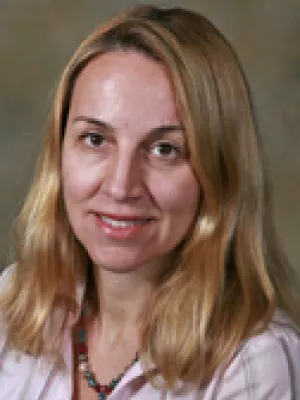Biography
Ortiz-Urda’s lab works with human models of epithelial neoplasia and melanoma. She studies cancer signaling at a genetic sequencing level to identify novel transcripts, their functions and the factors that promote resistance to drugs or cancer progression. She hopes her findings may point to key biomarkers or new targets for treating melanoma.
Ortiz-Urda earned her medical degree and doctorate at the University of Vienna. She completed a residency in dermatology and a postdoctoral fellowship in epithelial biology at Stanford University, followed by a cutaneous oncology fellowship at UCSF. She earned her master of business administration degree at New York University.
Ortiz-Urda is a member of the American Academy of Dermatology, Austrian Society of Dermatology and Venereology, and Dermatology Foundation. She has received several honors, including the Kardinal-Innitzer Award for Outstanding Science in Dermatology and the Unilever Award from the Austrian Society of Dermatology and Venereology.
Learn more about Ortiz-Urda's research: http://cancer.ucsf.edu/research/ortiz-lab.
Education
| Institution | Degree | Dept or School | End Date |
|---|---|---|---|
| New York University, NY | M.B.A. | Business Administration | 2014 |
| Stanford University | Resident | Dermatology | 2010 |
| University of California, San Francisco | Research Fellowship | Derm-Oncology | 2010 |
| The Brooklyn Hospital Center, NY | Internship | Medicine | 2006 |
| Stanford University | Postdoctoral Fellowship | Epithelial Biology | 2005 |
| AKH Vienna | Research Resident | Dermatology | 2001 |
| University of Vienna | Research Fellow | Dermatology | 1999 |
| Rappersberger, University of Vienna | PhD | Biology | 1998 |
| University of Vienna | M.D. | School of Medicine | 1998 |
Board Certifications
- American Board of Dermatology
Clinical Expertise
Basal Cell Carcinoma
Squamous Cell Carcinoma
Skin Cancer in Immunosuppressed Patients
Melanoma
Merkel Cell Carcinoma
Kaposi's sarcoma
Skin adnexal tumors
Skin sarcomas
General Dermatology
Cutaneous Oncology
Program Affiliations
Department of Dermatology
UCSF Melanoma Center
Member, UCSF Helen Diller Family Comprehensive Cancer Center
Research Narrative
My research interest is centered in the mechanisms involved in cancer progression. In recent studies we studied the role of tumor-stroma interactions in epithelial tumorigenesis. Our goal now is to identify the earliest melanoma precursors and to study the mechanisms of intraepidermal melanoma progression taking advantage of a human tissue model of human melanoma.
Our laboratory is currently pursuing studies of the signaling and gene regulatory networks that control this process. Our studies are designed to identify potential biomarkers in unresected occult melanoma, establish improved methods to identify occult intraepidermal melanoma, rationalize resection margins, and find treatments to reduce melanoma recurrence at the primary site. My lab is also interested in the epigenetic mechanisms involved in cancer progression and in expression analysis between consecutive stages of tumor progression. These studies are designed to identify targets for genes involved in the migration, proliferation, and invasion of mutant melanocytes.
Research Interests
Xenograft models of cutaneous neoplasia
Mechanisms of cancer progression: signal transduction pathways
Molecular therapeutics in cancer
Epigenetics
Publications
- Searching for the Chokehold of NRAS Mutant Melanoma.| | PubMed
- Acyl protein thioesterase 1 and 2 (APT-1, APT-2) inhibitors palmostatin B, ML348 and ML349 have different effects on NRAS mutant melanoma cells.| | PubMed
- The burden of malignant melanoma--lessons to be learned from Austria.| | PubMed
- Time-Dependent Measurement of Adverse Events-Reply.| | PubMed
- Pembrolizumab Cutaneous Adverse Events and Their Association With Disease Progression.| | PubMed
- Melanoma risk perception and prevention behavior among African-Americans: the minority melanoma paradox.| | PubMed
- Combined Inhibition of MEK and Plk1 Has Synergistic Antitumor Activity in NRAS Mutant Melanoma.| | PubMed
- Correction: Cost-Effectiveness Of Treatment Strategies for BRAF-Mutated Metastatic Melanoma.| | PubMed
- The risk of melanoma in pilots and cabin crew: UV measurements in flying airplanes.| | PubMed
- The combination of axitinib followed by paclitaxel/carboplatin yields extended survival in advanced BRAF wild-type melanoma: results of a clinical/correlative prospective phase II clinical trial.| | PubMed

